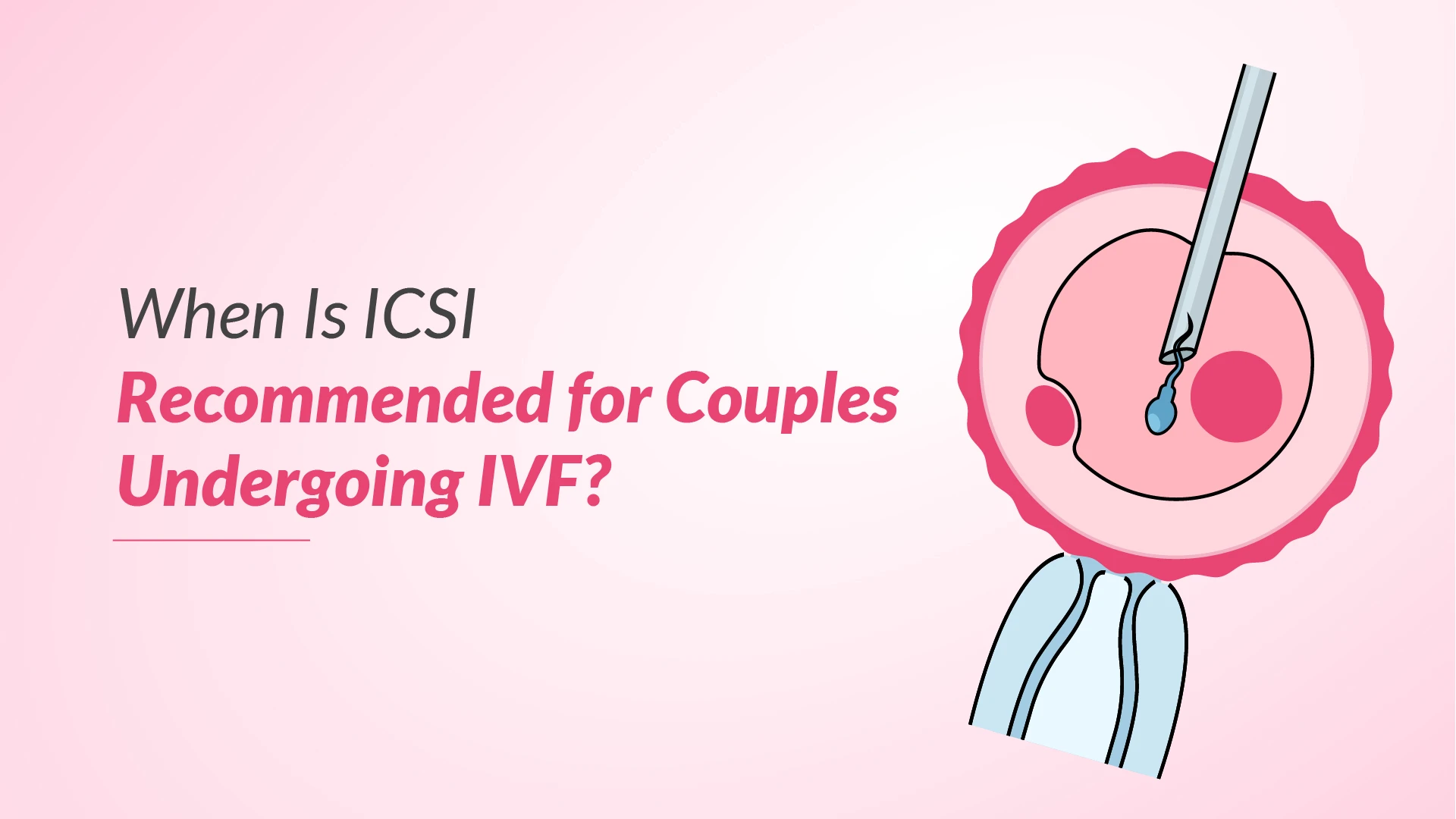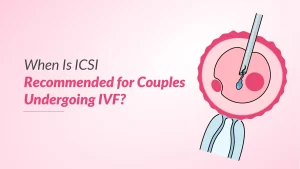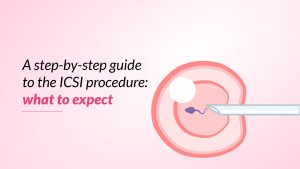For couples dealing with infertility, the journey towards parenthood can be filled with numerous challenges and emotional turmoil. In vitro fertilisation (IVF) has become a beacon of hope, offering a chance to overcome various fertility obstacles. However, in some cases, even the conventional IVF process may not be sufficient, and an additional technique called Intracytoplasmic Sperm Injection (ICSI) becomes a viable option. This article delves into the world of ICSI, exploring its benefits, indications, and the circumstances under which it is recommended for couples undergoing IVF.
What is ICSI?
ICSI is an advanced fertility treatment that involves the direct placement of a single sperm into a mature egg during the IVF process. Unlike traditional IVF, where multiple sperm cells are placed near the egg and left to fertilise independently, ICSI ensures that fertilisation occurs by manually introducing the sperm into the egg’s cytoplasm. This technique has proven to be a game-changer for couples facing male-factor infertility or other specific fertility challenges.
Benefits of ICSI
ICSI offers several benefits that have made it a valuable addition to the fertility treatment arsenal:
- Increased Fertilisation Rates: By directly injecting the sperm into the egg, ICSI bypasses potential barriers that may prevent natural fertilisation, resulting in higher fertilisation success rates.
- Overcoming Male Factor Infertility: For men with low sperm count, poor sperm motility, or abnormal sperm morphology, ICSI can significantly improve the chances of fertilisation.
- Genetic Testing Opportunities: ICSI allows for the selection of genetically healthy sperm, reducing the risk of passing on certain genetic disorders to offspring.
When Is ICSI Recommended?
While ICSI is not a one-size-fits-all solution, there are several circumstances where it is highly recommended for couples undergoing IVF:
Severe Male Factor Infertility
When a man’s semen analysis reveals low sperm count, abnormal sperm morphology, or poor sperm motility, ICSI becomes a crucial tool to overcome these challenges & increase the chances of successful fertilisation.
Azoospermia (Absence of Sperm)
In cases where a man has no sperm in his ejaculate (azoospermia), ICSI can be performed using sperm retrieved directly from the testicles or epididymis through procedures like testicular sperm extraction (TESE) or microsurgical epididymal sperm aspiration (MESA).
Suggested Read: TESA for Non-Obstructive Azoospermia
Failed Previous IVF Cycles
If a couple has undergone multiple unsuccessful IVF cycles with poor fertilisation rates or embryo development, ICSI may be prescribed to better the chances of successful fertilisation and embryo formation.
Genetic Disorders or Chromosomal Abnormalities
ICSI allows for the selection of genetically healthy sperm, reducing the risk of passing on certain genetic or chromosomal disorders to the offspring. This is particularly beneficial for couples with a family history of genetic conditions or those who have experienced recurrent miscarriages due to genetic factors.
Unexplained Infertility
In instances where the cause of infertility remains unexplained despite extensive testing, ICSI can increase the chances of successful fertilisation and pregnancy.
Low Ovarian Reserve or Poor Egg Quality
For women with a low ovarian reserve or poor egg quality, ICSI can maximise the chances of fertilisation by ensuring that each available egg is fertilised.
Previous IVF Failures Due to Poor Embryo Development
If previous IVF cycles resulted in poor embryo development or low-quality embryos, doctors may recommend ICSI to improve the chances of obtaining high-quality embryos for transfer.
High Risk of Sperm Damage
In situations where there is a high risk of sperm damage, such as in cases of severe male factor infertility, ICSI can protect the sperm from exposure to potentially harmful environmental factors during the fertilisation process.
Prior Issues with Embryo Transfer
Suppose a couple has experienced difficulties with embryo transfer during previous IVF cycles. In that case, ICSI may be recommended to ensure successful fertilisation and embryo development, potentially increasing the chances of a successful transfer.
Suggested Read: Embryo Transfer: What To Expect And How It Works?
Assisted Hatching Required
When assisted hatching is required to help the embryo hatch from its outer shell (zona pellucida), ICSI is often recommended to optimise the chances of successful implantation and pregnancy.
How ICSI Works
The ICSI procedure is a delicate and precise process that involves the following steps:
- Egg Retrieval: During an IVF cycle, mature eggs are retrieved from the woman’s ovaries through a minor surgical procedure.
- Sperm Preparation: A single, healthy sperm is carefully selected from the man’s semen sample or surgically retrieved sperm.
- Egg Immobilisation: The retrieved egg is immobilised using gentle suction to prevent it from moving during the injection process.
- Sperm Injection: Using specialised microscopic equipment and micromanipulators, doctors carefully inject the selected sperm directly into the cytoplasm of the immobilised egg.
- Fertilisation and Embryo Culture: After the injection, the fertilised egg (now called a zygote) is placed in a controlled environment to allow for embryo development.
- Embryo Transfer: Once the embryo have reached the desired stage of development, one or more embryos are carefully transferred into the woman’s uterus with the hope of successful implantation and pregnancy.
Benefits of ICSI
In addition to overcoming male factor infertility and increasing fertilisation rates, ICSI offers several other benefits:
- Genetic Testing Opportunities: ICSI allows for the selection of genetically healthy sperm, reducing the risk of passing on certain genetic disorders to offspring.
- Improved Embryo Quality: By ensuring successful fertilisation, ICSI can lead to the development of high-quality embryos, raising the chances of successful implantation & pregnancy.
- Reduced Risk of Fertilisation Failure: ICSI eliminates the need for sperm to penetrate the egg’s outer shell, reducing the risk of fertilisation failure due to potential barriers or sperm abnormalities.
- Increased Control over the Fertilisation Process: ICSI provides greater control over the fertilisation process, allowing fertility specialists to overcome specific challenges and optimise the chances of success.
How to Decide if ICSI Is Right for You
The decision to pursue ICSI during an IVF cycle is a highly personalised one and should be made in consensus with a qualified fertility specialist. Several factors will be considered, including:
- Results of semen analysis and male fertility evaluation
- Previous IVF outcomes and fertilisation rates
- Presence of genetic disorders or chromosomal abnormalities
- Ovarian reserve and egg quality
- Age and overall health of both partners
Your fertility specialist will carefully evaluate your unique situation, discuss the benefits & risks of ICSI, and provide guidance on whether this technique is recommended for your specific fertility journey.
Find Hope and Solutions for Female Infertility and Male Infertility — Explore Our Comprehensive Services
PICSI Treatment
Fertility Preservation Service
Blastocyst Culture & Transfer Treatment
Conclusion
ICSI has revolutionised the spectrum of assisted reproductive technology (ART), offering hope to couples facing various fertility challenges. From overcoming male factor infertility to increasing the chances of successful fertilisation & embryo development, this advanced technique has become a valuable asset in the fight against infertility. By understanding the circumstances under which ICSI is recommended, couples can make informed decisions and embark on their fertility journey more confidently and optimistically.





























